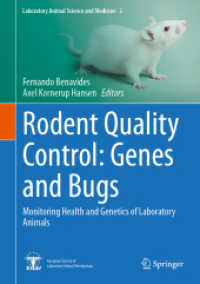- ホーム
- > 洋書
- > 英文書
- > Nature / Ecology
Full Description
Every year a huge amount of organic solid waste is generated globally. This quantity is expected to keep increasing, making sustainable, safe and environmentally responsible management of solid waste vitally important. Composting offers a circular and low-impact route to managing and treating organic solid waste and produces a nutrient rich medium with uses in horticulture and agriculture.
Beginning with a solid introduction to the fundamentals of composting, including bioreactor engineering, energy and mass transfer issues and microbiology, this book then moves on to more complex topics such as compost stability, gaseous emissions and compost uses. With a focus on sustainability, the role of composting in biorefineries and how composting can complement other technologies such as anaerobic digestion and solid-state fermentation are also discussed.
This book is a great resource for both students and researchers with an interest in organic waste management, sustainability or the circular economy.
Contents
Introduction
Composting and Its Benefits
Microbiology of Composting: From Petri Dishes to Current Knowledge, Advanced Microbial Techniques and Succession of Microbial Communities During Composting
Mass and Energy Balances
Respirometry of Organic Solid Wastes: Methods and Relevance to Understand the Composting Process and End-product Stability
Composting Modelling: State of the Art
Composting Systems
Home and Community Composters: Decentralised Systems
Invertebrate Facilitated Composting
Quality and Characterization: Understanding the Meaning of Compost Quality
Uses of Compost
Gaseous Emissions, Best Practices and Treatment: Biofiltration and Complementary Systems
LCA for Composting and Its Comparison with Other Organic Waste Treatment Options
Models of Separate Collection for High Quality Composting
The Role of Composting in the Sustainable Development Goals
The Future of Composting








